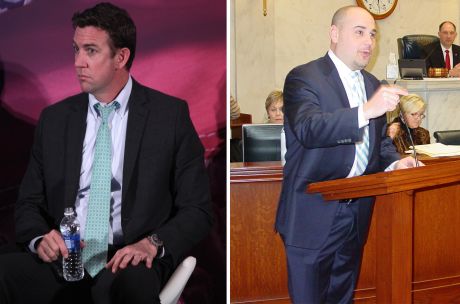This story was co-published by USA Today.
Introduction
Alabama’s Speaker of the House Mac McCutcheon has collected more than $248,000 in campaign donations ahead of the Nov. 6 elections. His opponent? Nobody.
McCutcheon is one of at least 26 legislative leaders in statehouses across America who are raking in cash despite running unopposed this year, according to a Center for Public Integrity analysis of National Institute on Money in Politics data. Two of these power brokers have already raised more than $2 million apiece.
The safe legislators represent an attractive prospect for statehouse lobbyists and power-seekers: the sure bet. Contributions to these influential politicians can buy face time and favor with those who set state legislative agendas, experts say. The money also compounds their power: Legislative leaders use their pots of gold to buy presents to thank supporters, for example, or give to fellow lawmakers’ campaigns to reward them for voting with their party.
“It makes a lot of sense to do what these contributors are doing,” said Michael Kang, a professor of law at Emory University who studies campaign finance. “They want to give to people in positions of power who are likely to be in positions of power for a while and can influence policy on the issues that they care about.”
So what exactly do the unopposed politicians do with all that cash? While some has gone to help out allies’ campaigns or purchase normal political kitsch — such as buttons and bumper stickers — a few legislative leaders spent their war chests on more than $513,000 in sports tickets for supporters, more than $24,000 for country club golf outings and even $25,000 to a family member’s accounting firm.
State rules vary for what officials can legally do with their campaign funds, but a basic premise holds true for many state and federal politicians, according to Jessica Levinson, a political ethics expert and professor of law at Loyola Law School in Los Angeles. “Campaign purposes are OK. Personal purposes are not,” Levinson said. “The money is not to be used to line your own pockets.”

Gage Skidmore / Creative Commons / Arkansas State Senate
Look to the recent past to see politicians across the U.S. who have gotten into trouble for how they’ve used their campaign accounts. Just last month, U.S. Rep. Duncan Hunter, R-Calif., and Arkansas Republican state Sen. Jeremy Hutchinson were both indicted for allegedly using campaign funds to pay for personal expenses such as clothing, luxury vacations, theater tickets and dentist bills. Former Alabama Gov. Robert Bentley resigned last year amid a scandal that included the Republican paying his lover’s salary with campaign funds.
Buying access
The speakers of the house, senate presidents, majority or minority leaders fundraising for unopposed re-election bids this year appear especially popular with corporations, unions and other groups, which are more likely to lobby legislatures than individuals. Those 26 legislative leaders have gathered 84 percent of their funds from such groups, compared with 70 percent for the 81 leaders who do face opposition, the Center for Public Integrity’s analysis found.
To be sure, nearly two dozen legislative leaders running for re-election do not appear to have raised any money yet, according to National Institute on Money in Politics data, though some of that could be due to lags in campaign data.
In the case of McCutcheon, all but $3,500 of the roughly $248,000 that the Alabama speaker collected in his campaign account has come from groups, not individuals, such as the Alabama Trucking Association, the Alabama Credit Union League and the employee PAC of the state’s influential utility, Alabama Power Company.
Most of the groups did not respond to questions about why they gave to McCutcheon. But a spokesman for the power company said its PAC donates to candidates who understand the concerns of its customers, employees and shareholders.
“Politics is what it is,” said McCutcheon when asked if he worried his donors were trying to influence him. “There’s always temptations. But if a person has a sense of integrity and character and they do not forget who they serve, they won’t ever have a problem with that.”
Separately, McCutcheon also has raised another $196,000 for a political action committee he controls called MACC PAC that aims to help elect fellow Republicans to the statehouse. State records current through the end of August show 87 percent of that money has come from corporations or other groups such as the Poarch Band of Creek Indians, which runs several casinos in the state.
McCutcheon said he has turned down “several thousand dollars” and asked those prospective donors to give to Republicans in competitive races instead.
“He’s a fair-minded guy, very popular,” said Bob Geddie, a lobbyist whose firm and one of its PACs gave McCutcheon’s campaign a combined $30,000. “It’s not unusual for a speaker to receive a considerable amount of campaign contributions.”
Geddie’s clients this year included Alabama Power Company, coal producer Drummond Company, lumber supplier Great Southern Wood and other titans of Alabama industry.
Attorney John Plunk, whom McCutcheon appointed to the state’s ethics commission last year, also gave $1,000 to the unopposed candidate’s campaign. Plunk’s appointment was announced in May 2017, and he gave to McCutcheon Aug. 25 of that year — six days before his appointment letter says his service began. Alabama’s five ethics commissioners are not allowed to make state and local campaign contributions.
McCutcheon said Plunk is a longtime supporter. Plunk, who also gave McCutcheon $500 in 2014 and considers McCutcheon a friend, said he does not think his contributions violated the rules or played a role in his appointment because the ethics commissioners do not hold sought-after positions.
Still, McCutcheon refunded Plunk’s contribution Sept. 5, after a reporter from the Center for Public Integrity inquired about the donation.
Vested interests
Iowa Speaker of the House Linda Upmeyer has also raked in large sums of money for her unopposed bid, collecting more than $567,000.
“She is definitely someone who wields a lot of influence,” said Matt Sinovic, executive director of Progress Iowa, a liberal advocacy organization. “Nothing would come to the floor without her signing off on it.”
Donors with legislative agendas are among those giving to Upmeyer. The employee PAC of Iowa casino company Peninsula Gaming gave $2,000 to the Republican’s re-election bid. The business’ parent company, Boyd Gaming Corp., has been expanding its sports betting operations across the country, and a state lawmaker in Iowa has already pledged to introduce a bill to legalize sports betting statewide next year.
Boyd Gaming Corp. declined to comment.
In the past, Upmeyer has received hefty donations from people invested in a gun rights’ legislative agenda. Iowa businessman Frank Brownell, owner of the country’s self-described largest supplier of firearm accessories, and his son, Pete Brownell, former head of the National Rifle Association, contributed $50,000 to Upmeyer’s 2016 unopposed campaign.
The next year, she helped shepherd into law the state’s most expansive gun rights bill. The 2017 legislation also allowed the sale of short-barreled rifles and shotguns — guns that companies like Brownells sell.
“It makes perfect sense to me,” said the Rev. Wendy Abrahamson, a member of 26 Days of Action against Gun Violence in Grinnell, Iowa, who recalled seeing Pete Brownell at the committee hearing for the bill.
Upmeyer declined to comment and neither Brownell returned requests for comment.
In Massachusetts, Speaker of the House Robert DeLeo has raked in more than $935,000 for his unopposed run, despite his state’s relatively strict campaign finance limits. A spokesperson for the Democrat’s campaign did not respond to requests for comment.
At least 39 donors gave DeLeo the maximum amount the state allows per two-year cycle — $2,000 from an individual or $1,000 from a political action committee.
Among DeLeo’s donors were the Massachusetts Health & Hospital Association, the Massachusetts Bankers Association and at least eight unions, such as the Massachusetts Corrections Officers Federated Union.
“The unions and the groups that give to DeLeo — they know that in order to get anything done, you have to go through the speaker,” said Paul Craney, spokesman for the Massachusetts Fiscal Alliance, a group that advocates for transparency in state government. “The money goes to him on the campaign side, and the tax dollars that go out are directed by him.”
What does the money get spent on?
Illinois politicians control the biggest war chests nationwide among unopposed legislative leaders running this fall. The Senate president, Democrat John Cullerton, has so far amassed more than $5.8 million since his last election in 2014, while Democratic Speaker of the House Michael Madigan has collected at least $2.6 million since his last bid in 2016, according to a Center for Public Integrity Analysis of data from the National Institute on Money in Politics. Senate Republican Leader Bill Brady raised more than $930,000, slightly less than Massachusetts’ DeLeo.
By comparison, Illinois House Minority Leader Jim Durkin, who faces a Democratic opponent in the November election, has raised more than $2.4 million.
Eric Bradach, an analyst with the watchdog group Illinois Campaign for Political Reform, said political donors hold sway with politicians in ways that average citizens do not.
“If someone were to donate $100,000 to one candidate … that candidate is most likely to pay more attention to the person who gave the $100,000 donation,” Bradach said. “They get more face time, more ear time from their respective party leaders.”
Bradach said legislative leaders use those vast sums to consolidate power, convincing lawmakers to toe the party line by offering to donate to cooperative lawmakers’ campaigns or threatening to fund challengers.
Cullerton’s campaign transferred nearly $3.8 million to other candidates or PACs, as of the latest state campaign filings that covered spending through June 30. Madigan, by that point, had transferred around $87,000.
In addition, Cullerton and Madigan are apparently fond of Chicago sports. Madigan’s campaign spent more than $513,000, and Cullerton’s paid more than $460,000, on tickets to see the White Sox, Cubs, Bulls and others play.
Illinois rules allow such spending as long as it is not for personal gain. Madigan’s campaign did not return calls requesting comment. Tom Elliott, communications director for the Illinois Senate Democrats’ campaign arm, said the tickets were given to charity groups or used for fundraising events “as a vehicle to cultivate new relationships with supporters and show appreciation and recognition of donors and volunteers.”
Brady, meanwhile, has transferred roughly $106,000 to other candidates or charities. He also has used his war chest to pay the Bloomington Country Club more than $24,000 for multiple golf outings, meals and drinks.
Brady’s campaign did not return calls requesting comment.
Back in Alabama, McCutcheon has spent about $111,000 of the $248,000 in campaign money he’s raised since his last race. More than $12,000 has gone to Republican groups.
But some of it has stayed closer to home. His campaign gave a $500 donation to his grandson’s basketball team and more than $25,000 for bookkeeping to a company incorporated by his son, Christopher McCutcheon.
Both expenditures may be in line with Alabama ethics rules. The Alabama Ethics Commission director declined to speak about McCutcheon specifically, but the rules allow candidates to give to nonprofits as well as pay family members who are providing a “bona fide service” to the campaign. McCutcheon told the Center for Public Integrity his son’s firm is doing bookkeeping and filing campaign reports for his unopposed bid.
McCutcheon said he plans to use any leftover campaign funds to host barbecue cookouts for lawmakers and their families to get to know each other better after the election — “rather than turning to lobbyists to pay for some of these events.”




Join the conversation
Show Comments
[…] Image via the Center for Public Integrity. […]
Good afternoon. Very interesting article. I agree with you that it’s bad what these people do, it’s not right and should be punished by law. The role of the voter is complex and responsible, therefore one should not remain captive of his first impressions of the images of candidates, political parties, and leaders artificially created during the election campaign. A rational and informed choice of candidates for power is needed. Did you know that, a quote from Wikipedia: “The message of the campaign contains the ideas that the candidate wants to share with the voters. It is to get those… Read more »